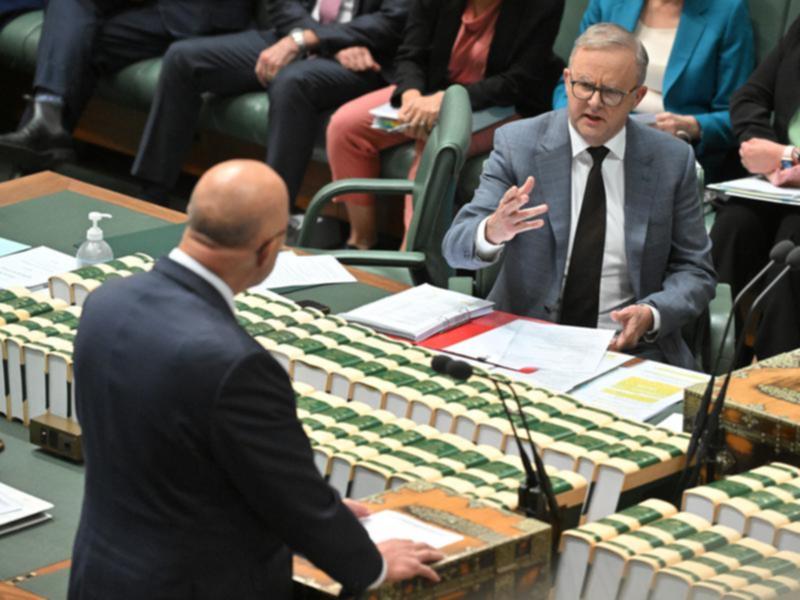DYLAN CAPORN: Voters love to complain about nastiness in politics. But we must share the blame
DYLAN CAPORN: Both parties are appealing to our worst selves, on the basis that if they convince us the other side is bad, perhaps we’ll opt to pick the lesser of two evils.

Just a fortnight into the year, and most Australians would likely have conflict fatigue from our leaders.
Anthony Albanese spent the first full week of 2025 traversing Australia’s north, attempting to shore up votes across Queensland, the Northern Territory and WA.
But the new year has brought with it a new level of bitterness from both the Prime Minister and the man who wants his job, Peter Dutton.
Sign up to The Nightly's newsletters.
Get the first look at the digital newspaper, curated daily stories and breaking headlines delivered to your inbox.
By continuing you agree to our Terms and Privacy Policy.“Peter Dutton only has a plan of saying ‘no’,” Albanese said in Rockhampton last week.
The next day in Mount Isa, the Prime Minister continued: “Just like the sun coming up in the morning, Peter Dutton’s out there being negative and being critical of something.”
Keen watchers would note Mr Dutton largely spent last week on the sidelines, sending out colleagues to rebut the Prime Minister’s northern tour, gearing up for the Liberals’ own election year soft launch on Sunday.
Drawing on a line the Liberals have been slowly rolling out over the past few months, Dutton slammed his target as being “weak”.
“Weak leaders create hard times — but strong leaders create better times,” the Opposition Leader said.
“Mr Albanese — who loves fighting Tories and who always plays the man and not the ball — has characterised this election as a ‘future war’. For him, what matters most is the political victory.
“I want our country to be victorious.”
Asked about the Liberals’ faux launch on Monday morning, Albanese called it “the biggest damp squib done by any political leader to begin a political year in an election year that I’ve ever seen”.
“Peter Dutton represents a cold-hearted, mean-spirited, sometimes just plain nasty response and that’s not going to help people,” he told ABC Radio.
Pushed on whether he believed politics needed to be “personal”, Albanese hit back with: “Peter Dutton has built a career on dividing people”.
Mr Dutton hit back by saying Mr Albanese had been the “weakest prime minister since Federation” making Gough Whitlam look like a “competent leader of our nation”.
“The Prime Minister is embarking on the personal attacks because he does not have a positive story to tell about himself,” he said.
Given how young the year is, it would seem remarkable the vindictiveness from both leaders is genuine.
Both have spent a significant period in the Parliament — Albanese was elected in 1996, and Dutton two elections later in 2001 — and would have had some contact with one another in the more than two decades they have shared a workplace.
Insiders say the pair certainly have a better relationship than Albanese had with his predecessor Scott Morrison. Behind the scenes, Albanese and Dutton are amicable, and have a shared respect for the primacy and processes of Parliament.
No doubt, Dutton’s decision to support the No campaign during the Voice referendum would have soured the discussions between the pair, and increased Albanese’s eagerness to go after the Opposition Leader.

But it feels like there’s more animosity in the 13 days already ticked off in 2025.
Politicians calling each other names is hardly new — history and elections are littered with personal diatribes aimed opponents.
Dutton’s launch leaned in heavily on the spirit of Donald Trump’s “Make America Great Again”, painting a dark picture of Australia, and the “pessimism” felt by voters under Labor.
Trump has redefined political stoushes, by launching into at times vile attacks against Democrats, public figures and even his own side. And he’s staring down a second term from next Tuesday.
The president-elect’s success has come from using the vitriol against his opponents to mobilise and strengthen the support of his base.
Party members and supporters need to feel as if they’re on the winning side of the election to remain motivated. Ideals are one thing, but actually having the chance to implement your ideological vision for a country is the goal.
And while voters often bemoan when MPs and candidates get too personal, it does not stop us voting for them when it comes time at the ballot box.
For both major parties, these lines are tested in focus groups of regular voters, who nod along or raise their hand when they hear a leader’s characteristic they believe is true.
“Albo’s weak”.
Nod.
“Dutton’s too negative”.
Nod.
Both parties are appealing to our worst selves, on the basis that if they convince us the other side is bad, perhaps we’ll opt to pick the lesser of two evils.
The personal is always political, and, whether we like it or not, politics is always personal.

